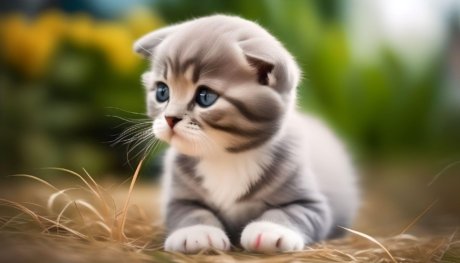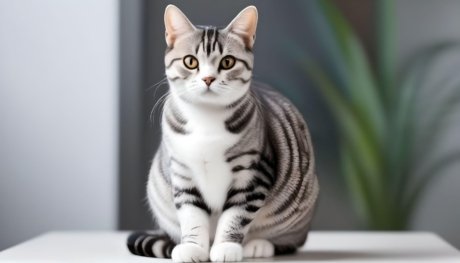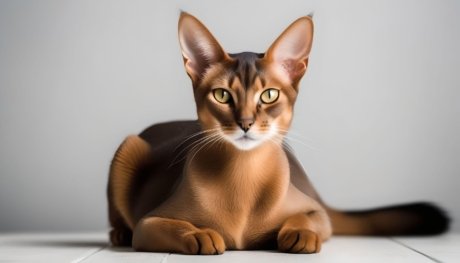Lykoi Cat | Breed Profile, Prices, 5 Types, Care Tips, Facts, Health Issues
If you’re intrigued by the unusual and captivating world of feline breeds, Lykoi cats are sure to pique your interest. Known as the “werewolf cats,” Lykoi felines are a rare and distinctive breed that has gained popularity for their unique appearance and endearing personalities. In this post, we’ll delve into the mysterious allure of Lykoi cats, exploring their history, appearance, and what makes them such intriguing companions for cat lovers. Whether you’re a seasoned cat enthusiast or new to the world of feline companions, the enigmatic Lykois are bound to leave an impression.
Lykoi
The Lykoi cat, often referred to as the “werewolf cat,” is a fascinating and unique breed known for its distinctive appearance. These cats have a striking resemblance to mythical werewolves, thanks to their partially hairless, patchy coat, and their piercing golden or yellow eyes. The breed’s name, “Lykoi,” is derived from the Greek word for “wolf,” which perfectly encapsulates their wolfish appearance.

Lykoi cats are a relatively new and rare breed that originated in the United States. They first gained recognition and popularity in the early 2010s. Their distinctive appearance is the result of a natural genetic mutation that affects the hair follicles. The mutation gives these cats their characteristic sparse, wolf-like fur, which often exposes their skin, giving them an eerie and captivating look.
These cats are medium-sized and have lean, muscular bodies. Their large ears and prominent cheekbones further contribute to their unique appearance. The Lykoi’s coat can vary in color and pattern, but they often have a combination of black and gray fur, giving them an unmistakable “werewolf” appearance.
One of the most striking features of Lykoi cats is their behavior and personality. Despite their unusual appearance, these cats are known for their friendly, affectionate, and social nature. They are known to be highly interactive with their owners, and they often form strong bonds with their human companions. Lykois are playful and love engaging in interactive activities, making them excellent family pets.
Their playful and energetic nature makes them great companions for children, as they are typically patient and gentle. Additionally, they get along well with other pets, making them an ideal choice for multi-pet households.
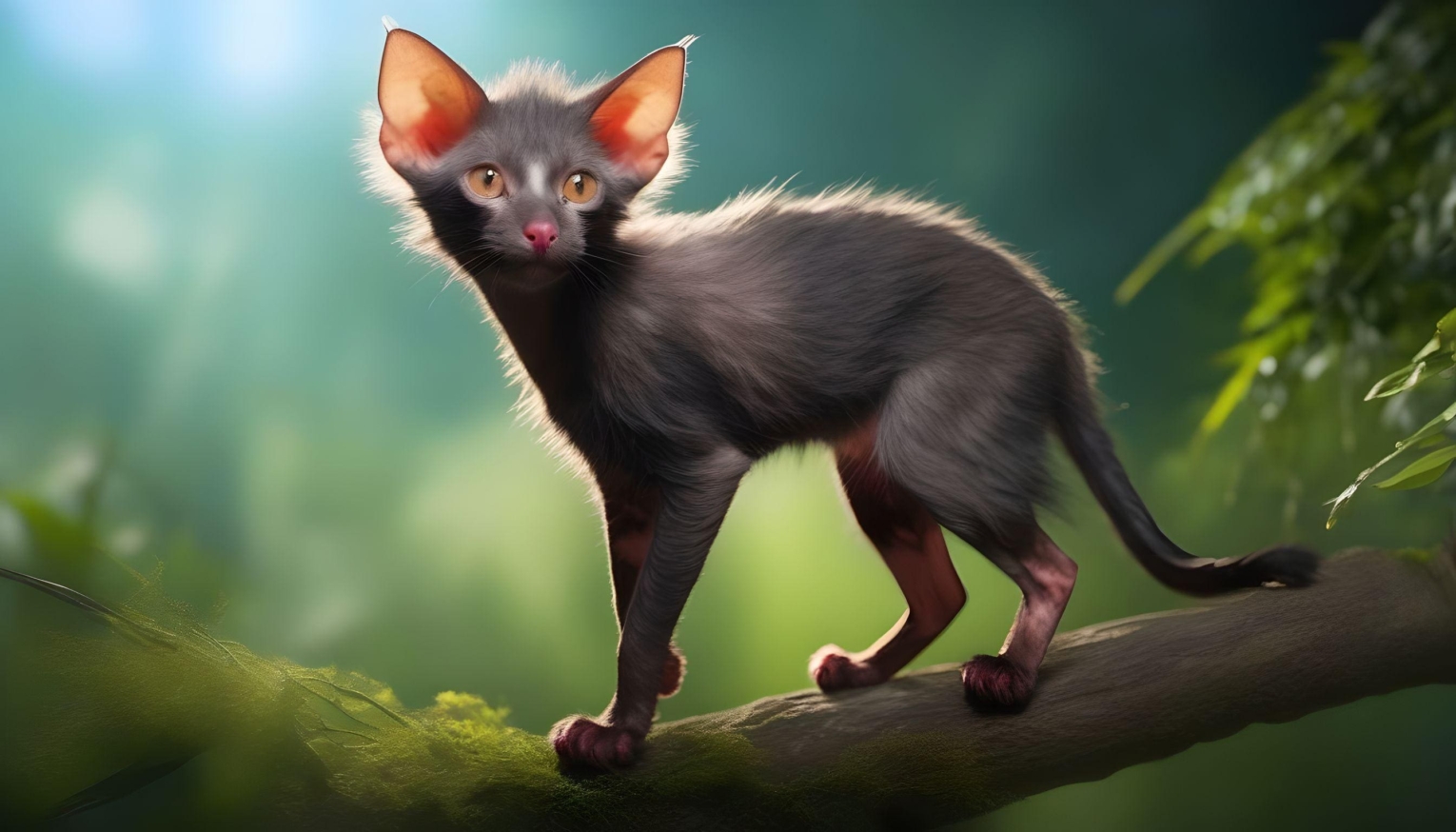
It’s important to note that while Lykois are generally healthy and hardy, they may have certain unique health concerns. Due to their partial hairlessness, they are more susceptible to skin issues and may need special care and attention. Regular grooming and protection from excessive sun exposure are essential to maintain their skin health.
Lykoi Characteristics
Here are some key characteristics of Lykoi cats:
| Characteristic | Description |
|---|---|
| Appearance | Partially hairless with a patchy, “werewolf” appearance |
| Coat Color | Typically black and gray, sometimes with white patches |
| Eye Color | Striking golden or yellow eyes |
| Size | Medium-sized, lean, and muscular body |
| Ears | Large and prominent ears |
| Personality | Friendly, social, and affectionate |
| Playfulness | Playful and energetic, enjoys interactive activities |
| Compatibility | Gets along well with children and other pets |
| Health Considerations | Susceptible to skin issues, requiring special care |
Lykoi Kitten

A Lykoi kitten is a young member of the Lykoi cat breed, often referred to as the “werewolf cat” due to its unique and distinctive appearance. Lykoi kittens are born with their signature patchy coat and striking golden or yellow eyes. These kittens are known for their playful and social nature, making them delightful companions for cat lovers.
Lykoi Werewolf Cat
The term “Lykoi Werewolf Cat” is often used as a popular nickname for the Lykoi breed. These cats are called “werewolf” cats due to their resemblance to mythical werewolves, with their partially hairless, patchy coat and captivating golden or yellow eyes. Lykois are not actual werewolves, of course, but their unique appearance has earned them this nickname.
Lykoi Maine Coon Mix
A Lykoi Maine Coon Mix refers to a hybrid cat that results from breeding a Lykoi cat with a Maine Coon. The Maine Coon is another distinctive and popular breed known for its large size, tufted ears, and friendly personality. Mixing these two breeds can produce kittens with a combination of features from both parent breeds, resulting in a unique and captivating feline companion.
Types of Lykoi Cats
While there is only one recognized breed of Lykoi cat, which is characterized by its distinct “werewolf” appearance, there are variations within this breed. These variations primarily revolve around the coat color and patterns, and they are often referred to as “types” or “varieties.” Here are some common types of Lykois based on coat variations:
1. Traditional Lykoi:
The traditional Lykoi cat is the quintessential representation of the breed, boasting the classic black and gray patchy coat that gives these felines their distinctive “werewolf” appearance. The patches of hairlessness are strategically arranged, resembling the natural shading often seen in wild canids like wolves. Traditional Lykoi cats are the most commonly encountered type and are known for their striking, almost otherworldly appearance.
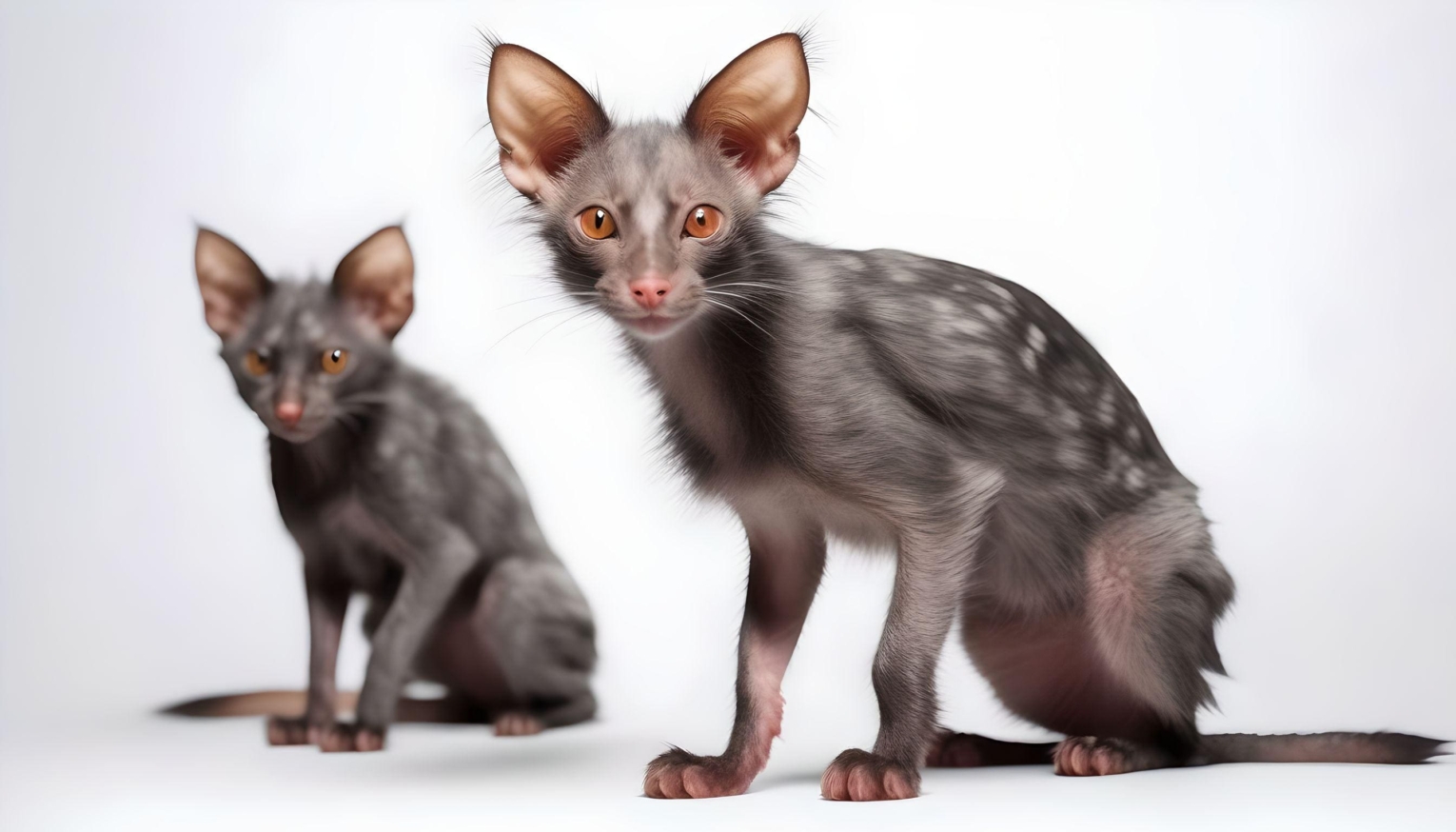
2. White Lykoi:
White Lykoi cats are a variation of the breed that may have a predominantly white coat with patches of the signature Lykoi fur pattern. These white patches contrast beautifully with their otherwise pale coat, giving them an ethereal and unique charm. White Lykois maintain the breed’s captivating features, such as their piercing yellow or golden eyes, making them equally enchanting as their traditional counterparts.
3. Silver Lykoi:
Silver Lykoi cats have a coat that leans towards a more silvery or lighter gray tone compared to the typical black and gray pattern seen in traditional Lykois. This variation provides a subtle yet striking contrast and showcases the breed’s flexibility when it comes to coat color.
4. Red Lykoi:
While less common, some Lykoi cats may exhibit reddish or ginger patches within their coat. These cats are known as Red Lykoi and offer a unique twist to the traditional Lykoi appearance. The presence of these warm, reddish hues adds an element of diversity to the breed’s color palette.
5. Blue Lykoi:
Blue Lykoi cats are characterized by a coat that is more bluish-gray in color compared to the typical black and gray pattern seen in traditional Lykois. This subtle variation offers yet another intriguing facet to the range of coat colors within the breed.
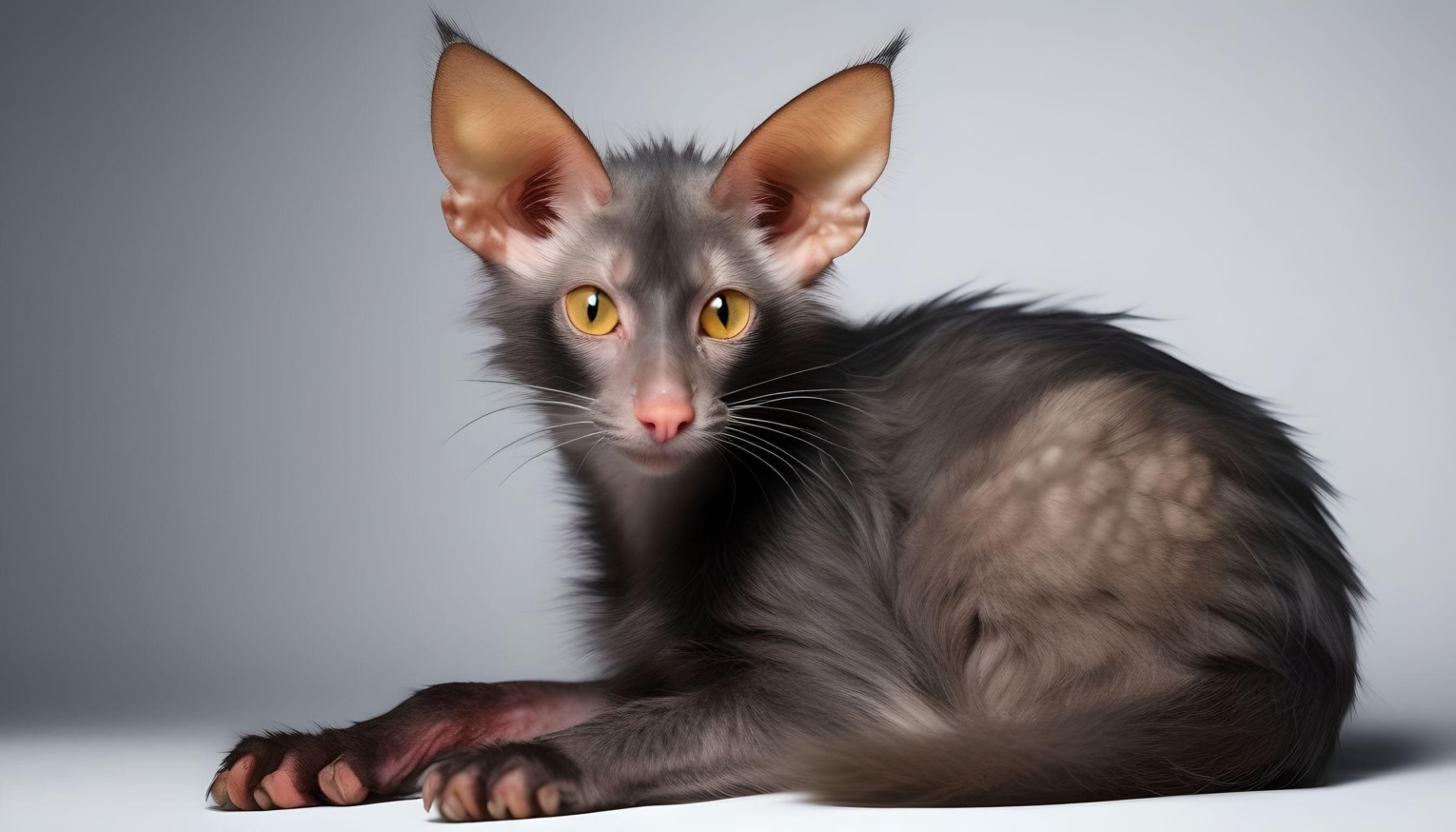
History of Lykoi
The Lykoi cat, often referred to as the “werewolf cat,” is a relatively recent breed that originated in the United States. The breed’s unique appearance is a result of a natural genetic mutation that affects the hair follicles. The mutation leads to a partially hairless and patchy coat, giving these cats their distinctive, eerie appearance. The Lykoi gained recognition and popularity in the early 2010s, and they continue to capture the hearts of cat enthusiasts worldwide.
Appearance of Lykoi Cats
Lykoi cats are known for their distinctive “werewolf” appearance. They have a partially hairless, patchy coat that often exposes their skin, giving them a unique and captivating look. The coat is typically black and gray, although variations such as white, silver, red, and blue Lykois exist. Their large ears and prominent cheekbones further contribute to their striking appearance, and they have piercing golden or yellow eyes.
Lykoi Cat Personality
Despite their unusual appearance, Lykoi cats are known for their friendly, affectionate, and social nature. They are highly interactive with their owners and often form strong bonds with their human companions. These cats are playful and enjoy engaging in interactive activities, making them excellent family pets. They are typically patient and gentle, making them great companions for children, and they also get along well with other pets.
Are Lykoi Cats Hypoallergenic
While Lykoi cats are unique in many ways, they are not hypoallergenic. Allergies to cats are primarily triggered by proteins found in a cat’s saliva, skin cells, and urine, rather than the cat’s fur. Lykois, like most other breeds, can produce these allergenic proteins. It’s essential for individuals with allergies to spend time with a Lykoi before adopting one to assess their individual reactions.
Temperament of Lykoi
Lykoi cats are known for their gentle and adaptable temperament. They are generally calm and patient, making them suitable for families and households with children. They are also playful and enjoy interactive play, making them engaging companions. Their sociable nature means they often enjoy spending time with their human family members.

Behaviour of Lykoi Cats
Lykois exhibit typical feline behaviors but with a friendly twist. They are known to be curious and intelligent, often exploring their environment and engaging in interactive play. They have a strong desire for social interaction, often seeking the company of their owners. These cats may also exhibit their hunting instincts through play, making them entertaining and active pets.
Lykoi Cat Price
The price of a Lykoi cat can vary significantly based on factors such as lineage, age, and breeder reputation. In the USA, you can expect to pay anywhere from $1,000 to $3,000 or more for a Lykoi Cat. In India, the price range of Lykoi Cat is typically between ₹40,000 to ₹1,50,000 or higher, depending on similar considerations.
Lykoi Cat Price in United States:
In the United States, the price of a Lykoi cat can vary widely depending on factors such as lineage, age, and breeder reputation. Generally, you can expect to pay anywhere from $1,000 to $3,000 or more for a Lykoi kitten.
Lykoi Cat Price in India:
In India, the cost of a Lykoi cat typically ranges between ₹40,000 to ₹1,50,000 or even higher. Prices can vary based on the breeder’s reputation and the cat’s pedigree, health, and age.
Lykoi Cat Price in United Kingdom:
In the United Kingdom, the price of a Lykoi cat can be similar to that in the United States, ranging from £800 to £2,500 or more, depending on various factors including the cat’s quality and lineage.
Lykoi Cat Price in Canada:
In Canada, the cost of a Lykoi cat is generally in line with prices in the United States, ranging from $1,000 to $3,000 or more, depending on the breeder and the cat’s characteristics.
Lykoi Cat Price in Australia:
Lykoi cats are less common in Australia, and as such, their price may be higher. Prices can range from AUD 1,500 to AUD 4,000 or more, depending on the specific circumstances and availability.
Lykoi Prices In Major USA and Indian Cities
Here are the estimated Prices of Lykoi cat in major cities in the USA and India:
| City | Lykoi Price in USA | City in India | Lykoi Price in India |
|---|---|---|---|
| New York City | $1,000 – $3,000+ | Mumbai | ₹40,000 – ₹1,50,000+ |
| Los Angeles | $1,000 – $3,000+ | Delhi | ₹40,000 – ₹1,50,000+ |
| Chicago | $1,000 – $3,000+ | Bangalore | ₹40,000 – ₹1,50,000+ |
| Houston | $1,000 – $3,000+ | Chennai | ₹40,000 – ₹1,50,000+ |
| Miami | $1,000 – $3,000+ | Kolkata | ₹40,000 – ₹1,50,000+ |
| San Francisco | $1,000 – $3,000+ | Hyderabad | ₹40,000 – ₹1,50,000+ |
| Atlanta | $1,000 – $3,000+ | Pune | ₹40,000 – ₹1,50,000+ |
| Dallas | $1,000 – $3,000+ | Ahmedabad | ₹40,000 – ₹1,50,000+ |
| Washington, D.C. | $1,000 – $3,000+ | Jaipur | ₹40,000 – ₹1,50,000+ |
| Boston | $1,000 – $3,000+ | Chandigarh | ₹40,000 – ₹1,50,000+ |
Factors that Affect the Price of Lykoi
Some common Factors that Affect the Price of Lykoi:
- Pedigree and Lineage: Lykoi with well-documented pedigrees and strong lineage from reputable breeders often command higher prices. A cat with a prestigious lineage is more likely to exhibit the desired breed characteristics.
- Age of the Cat: The age of the Lykoi can influence its price. Kittens are typically more expensive than older cats. Younger cats may be in higher demand due to their potential for a longer life with their owners.
- Health and Vaccinations: Cats with up-to-date vaccinations, good overall health, and documented medical records tend to be priced higher. Buyers often prefer cats with a clean bill of health.
- Coat Color and Pattern: The coat color and pattern of a Lykoi can impact its price. Some variations, such as the classic black and gray, may be more sought after, while rarer colors or patterns can command a premium.
- Breeder Reputation: Reputable breeders who adhere to ethical breeding practices, prioritize the health and well-being of the cats, and provide proper documentation often charge more for their Lykois.
- Geographic Location: Prices may vary by region and country due to differences in supply and demand. In areas with fewer breeders and a high demand for Lykois, prices can be higher.
- Registration and Papers: Lykois that come with official registration papers and certifications from breed associations are generally more expensive. These documents provide assurance of the cat’s breed authenticity.
Monthly Maintenance Cost of Lykoi Breed:
The monthly maintenance cost of Lykois includes various expenses to ensure their well-being:
- Food: High-quality cat food is essential. The monthly cost can range from $20 to $50 or more, depending on the brand and dietary requirements.
- Litter and Accessories: Expenses for litter, litter boxes, toys, and scratching posts can amount to around $20 to $30 per month.
- Healthcare: Regular veterinary check-ups, vaccinations, and preventive medications may cost approximately $30 to $50 per month.
- Grooming: Lykois may require minimal grooming, including occasional baths. Grooming supplies can cost about $10 per month.
- Insurance: Pet insurance is recommended to cover unexpected veterinary expenses and can cost $20 to $40 per month.
- Miscellaneous Costs: This category includes treats, grooming services (if needed), and other unforeseen expenses, which can amount to approximately $20 per month.
Facts about Lykoi Cats
Here are some interesting facts about Lykoi Breed:
- Natural Mutation: Lykois owe their unique appearance to a natural genetic mutation that affects their hair follicles, resulting in a partially hairless, patchy coat.
- “Werewolf” Resemblance: Due to their eerie appearance, Lykois are often referred to as “werewolf cats.” They have a striking resemblance to mythical werewolves.
- Recent Breed: The Lykoi is a relatively new and rare breed that first gained recognition in the early 2010s.
- Friendly Personality: Despite their unusual appearance, Lykoi cats are known for their friendly, social, and affectionate nature. They form strong bonds with their human companions.
- Playful and Energetic: These cats are playful and enjoy engaging in interactive activities. They are known for their love of playtime.
- Good with Children and Pets: Lykois are generally patient and gentle, making them excellent companions for children and getting along well with other pets.
- Skin Health: Due to their partial hairlessness, Lykois may require special attention to their skin health. Regular grooming and protection from excessive sun exposure are essential.
- Varied Coat Colors: While the classic Lykoi has a black and gray coat, variations include white, silver, red, and blue Lykois.
- Unique Facial Features: Lykoi cats have large ears and prominent cheekbones, contributing to their distinctive appearance.
- Breed Popularity: Lykois have captured the hearts of cat enthusiasts around the world and continue to grow in popularity, making them sought-after feline companions.

Pros and Cons of Lykoi Cats
Some common pros and cons of Lykoi cats:
| Pros | Cons |
|---|---|
| Unique Appearance: Distinctive “werewolf” look makes them stand out. | Health Concerns: Susceptible to skin issues requiring special care. |
| Friendly Personality: Lykois are social, affectionate, and bond with their owners. | High Demand: Their rarity can lead to high prices and difficulty finding them. |
| Playful Nature: They are known for their playful and interactive behavior. | Allergenic: Like other cats, they can trigger allergies in some people. |
| Compatibility: Get along well with children and other pets. | Coat Maintenance: May need regular grooming due to their unique fur. |
| Varied Coat Colors: Options include traditional, white, silver, red, and blue Lykoi. | Rare Breed: Availability may be limited in certain regions. |
Care Tips for Lykoi Cats
Caring for a Lykoi involves attention to their unique characteristics and needs. Here are some care tips for Lykoi cats:
- Regular Grooming: Due to their partially hairless and patchy coat, Lykoi cats may require more frequent grooming than other breeds. Brushing them a few times a week can help remove loose fur and prevent matting.
- Skin Protection: Protect their exposed skin from sunburn by ensuring they have access to shaded areas. Sunscreen formulated for cats may also be used on sensitive areas, such as their ears and noses.
- Quality Diet: Provide a high-quality cat food appropriate for their age and activity level. Consult with your veterinarian to determine the best diet for your Lykoi.
- Interactive Play: Lykoi cats are playful and enjoy interactive play. Regular playtime with toys and engaging activities can keep them mentally and physically stimulated.
- Health Check-ups: Schedule regular veterinary check-ups to monitor their health and address any concerns promptly. Keep up with vaccinations and preventive medications as recommended by your vet.
- Allergen Management: If anyone in your household is allergic to cats, consider allergen-reducing strategies such as using HEPA air purifiers and keeping your home clean.
- Social Interaction: Lykoi cats are known for their social nature. Spend quality time with them, as they thrive on human companionship and interaction.
- Safe Environment: Ensure your home is safe for your Lykoi by removing hazards and providing ample opportunities for exercise and mental stimulation.
- Proper Breeding: When adopting a Lykoi, choose a reputable breeder who follows ethical breeding practices, prioritizes the cat’s health, and provides necessary documentation.
- Love and Affection: Lykoi cats form strong bonds with their owners, so be sure to offer them love and affection. They enjoy being a part of the family and often seek attention.
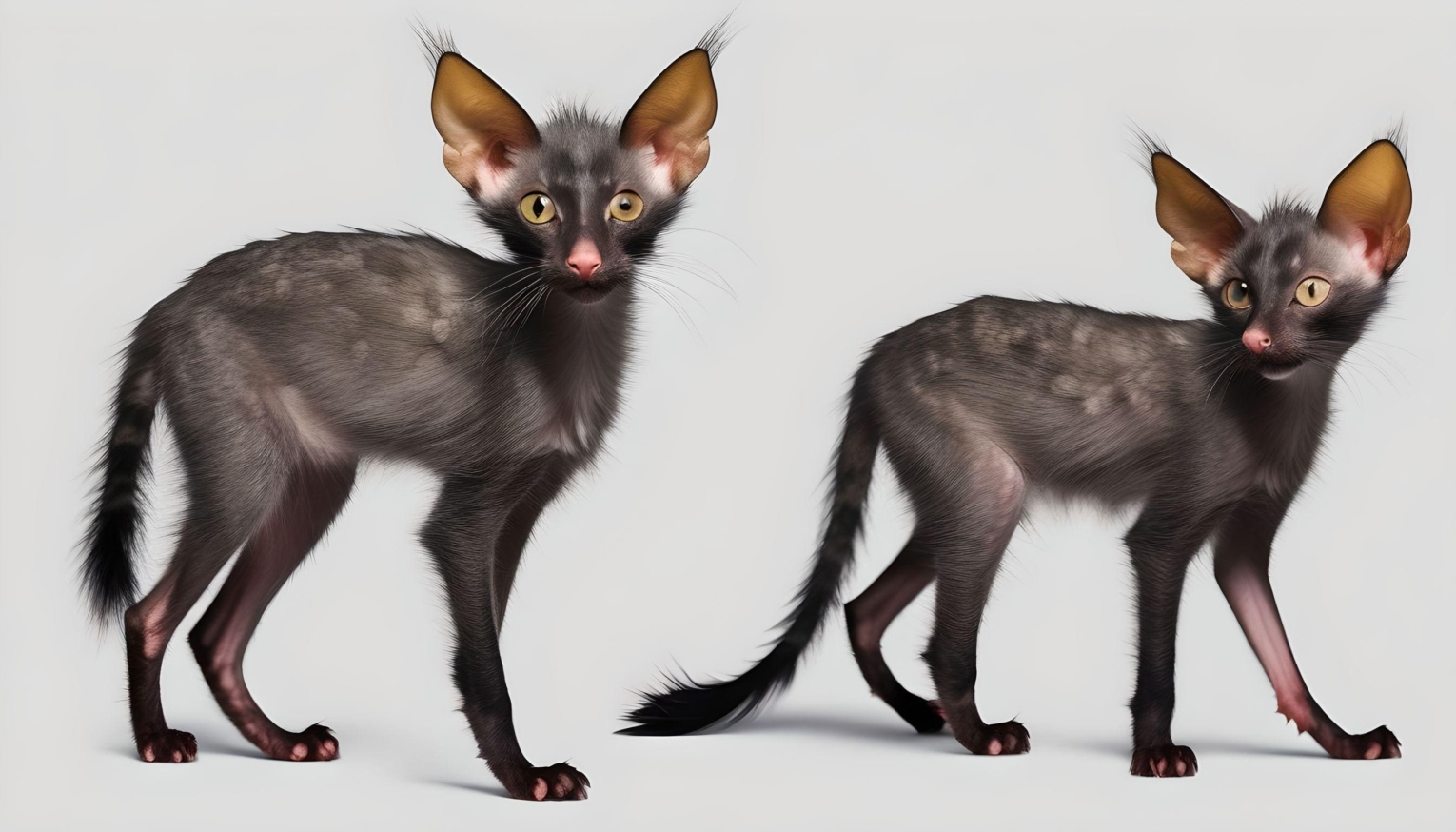
Full Grown Lykoi Cat
A full-grown Lykoi cat typically reaches its adult size and weight at around 1 to 2 years of age. They are considered full-grown when they have reached their mature size and have developed their distinct “werewolf” appearance, characterized by a partially hairless, patchy coat.
Lykoi Cat Health Problems
While Lykoi cats are generally healthy, they can be prone to specific health issues due to their unique coat and genetic characteristics. Some of the potential health problems that may affect Lykoi cats include:
- Dermatological Issues: The most common health concern for Lykoi cats is related to their skin. Their partially hairless and patchy coat can make them more susceptible to skin conditions such as dermatitis, sunburn, and fungal infections. Proper skin care, including sunscreen application and regular grooming, is essential to mitigate these issues.
- Digestive Disorders: Like many other cat breeds, Lykois can develop digestive disorders such as irritable bowel syndrome (IBS) and food allergies. Providing a high-quality diet and monitoring their gastrointestinal health can help prevent and manage these conditions.
- Cardiovascular Problems: Hypertrophic cardiomyopathy (HCM), a heart disease common in cats, can also affect Lykoi cats. Regular veterinary check-ups, including heart health assessments, are important for early detection and management.
- Hip Dysplasia: Some Lykoi cats may be prone to hip dysplasia, a condition where the hip joint doesn’t develop properly. While not exclusive to this breed, it’s essential to monitor their mobility and seek veterinary care if signs of hip dysplasia are observed.
- Eye Issues: Lykoi cats may occasionally develop eye conditions, including conjunctivitis and eye infections. Regular eye checks can help detect and treat such issues in a timely manner.
- Allergies: Lykoi cats, like other breeds, can trigger allergies in some individuals. It’s important to be aware of potential allergies when bringing a Lykoi cat into your home.
Lykoi Lifespan
In terms of lifespan, Lykoi cats, like most domestic cat breeds, have an average lifespan of around 15 to 20 years when provided with proper care, a balanced diet, regular veterinary check-ups, and a safe and loving environment. However, it’s important to note that individual lifespans can vary, and some Lykoi cats have been known to live well into their 20s when well cared for. Ensuring that your Lykoi cat receives the necessary attention and healthcare can contribute to a longer and healthier life.
Food for Lykoi Cats
Some common Food options for Lykoi Cats:
| Food Type | Description |
|---|---|
| High-Quality Cat Food | Provide a balanced diet specifically designed for cats. Look for brands with meat as the primary ingredient and minimal fillers. |
| Wet Cat Food | High-moisture wet food can help keep Lykoi cats well-hydrated. Choose canned cat food with quality protein sources. |
| Raw or Homemade Diet | Some owners opt for raw or homemade diets under veterinary guidance, ensuring it meets all nutritional requirements. |
| Occasional Treats | Offer occasional cat treats, but use them sparingly to prevent overindulgence. Ensure treats are appropriate for cats. |
| Fresh Water | Ensure access to clean, fresh water at all times to keep your Lykoi cat well-hydrated. Hydration is crucial for their skin health. |
Names for Lykoi Cats
Some popular Names for Lykoi Cats:
| Names for Male Lykoi Cats | Names for Female Lykoi Cats |
|---|---|
| Shadow | Luna |
| Wolf | Mystique |
| Loki | Sable |
| Raven | Bella |
| Hunter | Willow |
| Echo | Freya |
| Gryphon | Nyx |
| Orion | Misty |
| Asher | Phantom |
| Diesel | Twilight |
Lykoi Video
Conclusion:
In conclusion, Lykoi cats, with their unique “werewolf” appearance and friendly personalities, have captured the hearts of cat enthusiasts worldwide. Their distinctive characteristics and social nature make them a fascinating and engaging breed. While they may require special care due to their partially hairless coat, their captivating charm and playful disposition have made them increasingly popular among those seeking a one-of-a-kind feline companion.
Frequently Asked Questions on Lykoi Cats:
-
What is a Lykoi cat?
A Lykoi cat, often called a “werewolf cat,” is a unique feline breed known for its distinctive appearance, featuring a partially hairless, patchy coat and striking golden or yellow eyes.
-
Are Lykoi cats a recognized breed?
Yes, Lykoi cats are a recognized breed with distinct breed standards and characteristics.
-
Where do Lykoi cats originate from?
Lykoi cats originated in the United States, and their distinctive appearance is the result of a natural genetic mutation.
-
What is the typical personality of a Lykoi cat?
Lykoi cats are known for their friendly, affectionate, and social nature. They form strong bonds with their owners and are playful and interactive.
-
Are Lykoi cats hypoallergenic?
No, Lykoi cats are not hypoallergenic. Like all cats, they can produce allergenic proteins that may trigger allergies in sensitive individuals.
-
How do I care for the unique coat of a Lykoi cat?
Regular grooming and protection from sun exposure are essential for maintaining the skin health of a Lykoi cat due to their partially hairless coat.
-
What is the price of a Lykoi cat in the USA and India?
In the USA, the price of a Lykoi cat typically ranges from $1,000 to $3,000 or more. In India, the price can vary between ₹40,000 to ₹1,50,000 or higher.
-
What is the lifespan of a Lykoi cat?
Lykoi cats have an average lifespan of 15 to 20 years when provided with proper care, although individual lifespans can vary.
-
Are there different types of Lykoi cats based on coat variations?
Yes, there are different types of Lykoi cats, such as traditional Lykoi, white Lykoi, silver Lykoi, red Lykoi, and blue Lykoi, based on coat color and pattern variations.
-
How can I find a reputable Lykoi cat breeder?
Look for breeders who follow ethical breeding practices, prioritize the health and well-being of the cats, and provide necessary documentation. Research and read reviews from other buyers to gauge a breeder’s reputation.
Recommended –
- Abyssinian Cat | Breed Profile, Price, 15 Facts, Care Tips, Health Issues
- American Shorthair Cat | Breed Information, Prices, 10 Types, Care Tips
- Munchkin Cat | Breed Information, Price, 10 Facts, Care Tips, Food
- Siamese Cat | Price, Breed Information, Expenses, Care Tips, Food, Health
- Cat Price In India ₹ | 28+ Different Breeds, Monthly Cost
- Cat Price In Delhi | Best Breeders, 20 Cat Shops, Breeds
- Pet Cat Price | 5 Different Cat Breeds Prices, Food, Care



























